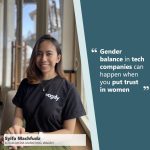
Syifa Machfudz on #WinWithWomen – social media marketing in a male-dominated tech industry
15 September, 2021
IBM to expand security portfolio with plans to acquire ReaQta
4 November, 2021
#WinWithWomen – the women at Integra Partners
29 September, 2021
On our final feature of #WinWithWomen, we speak to the women at Integra Partners – Jennifer Ho, Wen Ling Lim, Elise Tan, Jennie Kosasih and Sabiha Sutan.
We shared in a previous post that Integra Partners joined the 2X Challenge which aims to collectively mobilize US$3 billion in commitments that provide women in developing country markets with improved access to leadership opportunities, quality employment, finance, enterprise support and products and services that enhance economic participation and access. Our involvement is sponsored by our partner DEG in recognition of our Fund’s strong commitment to women – in our team, which consists of 50% female professionals in leadership roles and in our investments in portfolio companies, which has achieved 42% female employment.
In this piece, we cover everything from what the Integra women do, our background, how we manage as mothers & working women, what we look for in entrepreneurs, how companies can encourage gender balance and our thoughts on the future of VC.
Can you tell us more about your role here?
Jen: I’m an investment principal at Integra, but to be honest the team here is small and the culture is flat so everyone gets involved in everything.
Ling: As COO at Integra, I cover finance, operations, investor and regulatory reporting, HR, community and anything to support the team to ensure that the business runs smoothly.
Elise: I’m general counsel at Integra. My day-to-day generally comprises providing both legal and regulatory compliance support to the investment team.
Sabiha: My role at Integra is to help with fundraising. However given the Covid-19 situation and the fact that I have been stuck in Karachi, Pakistan, I am looking at investment opportunities that exist here in the local market, especially since the technology scene here is currently very hot.
Jennie: My role in Integra is in investments, focusing on evaluating and analyzing potential investment deals. My day-to-day responsibilities include sourcing for potential startups to invest in, meeting founders, modelling, and preparing cap tables and investment memos for our investment committee to consider.
What made you interested in entering the VC industry in your respective roles?
Jen: I’d love to start spending more time on femtech, especially now that we’re part of the 2X Challenge. I think that right now, women’s health issues are a very underserved market, and it is a field that is just getting started. To draw an analogy to fintech, I think we’re in the e-wallets phase of the sector – everyone is going after the low-hanging fruit first, and while there will be some very successful companies that come out of this, I also think it’s really hard to find companies that are working on truly unique solutions. Right now, a lot of companies are focused on reaching the consumer, and are relying on branding and messaging and packaging to distinguish themselves. But as we’ve seen in fintech, I think the field will evolve, and more and more interesting and differentiated solutions with sustainable competitive advantages will emerge.
Elise: The wide variety of work as a VC legal counsel was a key driving factor (together with the opportunity of working with an A-team, of course!) in me taking the plunge to quit private practice and join Integra as in-house counsel. At any given day, I could be working on deal related transactional work, fundraising documentation, operational matters, addressing ad-hoc legal issues from portfolio companies etc. Every day on the job is never really the same and poses a different set of challenges. I also love how there is generally no one-size-fits-all approach to the legal issues that I deal with in this job and how the process of navigating the best legal solution oftentimes involves being keenly attuned to the prevailing commercial needs and objectives.
As Integra takes an active approach to investing, being a part of that collaborative process together with founders has also been extremely meaningful and exciting. It is interesting to witness first-hand the growth of our portfolio companies from the time of our initial investment and how legal issues evolve at each stage of a company’s growth as we navigate some of these legal issues with our founders.
___________
“As Integra takes an active approach to investing, being a part of that collaborative process together with founders has also been extremely meaningful and exciting.”
___________
Having started out as a barrister, what led to your transition into corporate finance?
Sabiha: I believe that the reality of life is such that opportunities are thrown at you and sometimes it’s about being in the right place at the right time. I transitioned from being a Barrister as back then when I first started, you had to be self funded and I frankly could not afford it. I was having lunch with an old friend who worked in an investment bank and we happened to bump into her boss who then asked about me. The next thing I knew I was asked to interview for a job in corporate finance – As I had to decide between a steady income, company car and expense account versus working as a struggling barrister with no pay (which is normal for the first 10 years, hence the need for financial backing at that time) I chose the steady pay cheque and the rest is history as they say.
It must not be easy being a full-time COO and full-time mom, what would you say is your biggest challenge? Could you share some tips about work-life balance?
Ling: Working-mum guilt is real and I do struggle with this at times. Based on my experience, there is no perfect formula or equation for how much time to dedicate to either. I think the key is perspective, and defining why we work, be it money, personal satisfaction or just as an outlet and letting that centre us when we feel overwhelmed or guilty for missing a basketball game or not baking the perfect birthday cake. As I’ve concluded that there is no perfect balance, I prefer to look at it from the perspective of work-life satisfaction.
___________
“There is no perfect formula or equation for how much time to dedicate to a work-life balance. I think the key is perspective and defining why we work.”
___________
For me, it’s about giving my kids the best of me and that requires me to be at my best, mentally and physically. When I feel like I’m contributing, I’m challenged and I’m working with a team that builds each other up, that gives me joy and purpose. Right now from a work perspective, that’s Integra, and physically it’s going for a run or squeezing in an online barre class – with this I feel my best and I can then give my family my best. I’m convinced that ultimately my family is better off when I have a rewarding career.
Something that helps with work-life satisfaction for me, is to be present. Consciously organising activities with the kids on weekends so that I’m not tempted to head back into the study and being fully present when I’m with them. This makes our time together intentional and meaningful.
What would you say is your biggest success or career highlight?
Ling: I can’t say that there is one biggest success or highlight but rather – that at this stage in my career I feel incredibly blessed to have worked on a range of different projects. I spent the first 11 years of my career with 2 of the 4 big accounting firms. I started out in Perth, Australia, where hard work paid off with early promotions. After spending 10 years with the big 4, I co-founded a mission-focused brand with a close friend. With our company mission aimed at promoting mental resilience, personal reflection and kindness, we had the privilege of driving numerous campaigns with the Samaritans of Singapore and the Singapore Association for Mental Health to help destigmatize and encourage the community to start simple conversations around mental health and wellbeing. The ability to contribute in this space, made the years of hard work all worth it. After building the business and successfully exiting to now being part of the Integra team where I am surrounded by a team of incredible women and men – the accumulation of all these things makes me incredibly grateful and excited for the journey ahead.
What are some traits you look out for in an entrepreneur?
Jen: I think there are lots of traits that are non-negotiables, right – a sense of integrity, the ability to lead, the ability to balance having a strong vision for the company with the ability to lean on others for advice and feedback. But an interesting common trait I’ve also noticed among successful entrepreneurs is the ability to tell their companies’ stories in a way that is compelling and easy to understand. Very often we’re meeting companies that are looking to address huge inefficiencies in highly regulated industries that would be completely opaque to an outsider. So how do you make people care? How do you explain what you do in a way that other investors will understand, that makes other people want to support you in your mission?
___________
“How do you explain what you do in a way that other investors will understand, that makes other people want to support you in your mission?”
___________
What can founders and management do to encourage gender balance in tech companies?
Jen: This is a great question, and an issue that I think about a lot. People always start with quotas, of course – we want a team to be at least x% female, or we want a board to have at least y% female representation. To an extent that’s important, because I do think that you need to have a diversity of perspectives represented when key decisions are made. But I prefer to focus on equality of opportunity rather than equality in outcomes. So that means ensuring that when you’re hiring for a role, interviewing a gender-balanced mix of candidates, for example. And when you’re writing a job description, make sure that you’re writing it in a way that is appealing and welcoming to both genders. (There’s a bunch of research that indicates that how roles are described affects whether or not women feel like they should apply – for example, if the role describes a “leader” in a “competitive environment” or if the role emphasizes “teamwork” and “interpersonal skills”.) Or when you’re a company that skews heavily male, making sure that when you hire female employees, that they are set up for success rather than for failure. That last one is just good business practice anyway – you should never go through the time-consuming process of hiring without making sure that you’ve given the person you ultimately hire the best chance they have for success. A lot of this is harder than simply setting gender quotas, but also meaningful, and hopefully it naturally results in more gender balance.
___________
“When you’re a company that skews heavily male, making sure that when you hire female employees, that they are set up for success rather than for failure.”
___________
Where do you see the future of VC going?
Sabiha: I think it’s an interesting time for VCs, and as always it’s about having access to reliable information. Until a few years ago startups’ only choice for funding was venture capital firms. Now there’s LPs who might have been passive investors before now directly investing in startups, family offices also investing in startups especially as the next generation takes an interest in technology, retail investors looking to angel invest, crowdfunding platforms, corporate venture arms, and sovereign wealth funds.
I believe that with this increased interest in the VC market regulations will come. History has shown that it only takes one crash and retail investors losing their monies to make regulators push for regulations to be brought in. This will inevitably mean that at some point size will matter for funds to survive or they will have to have a very defined investing methodology that differentiates them, so they stand out. VC funds will have to also provide extra value in some form, such as providing more hand holding to help businesses develop, for example.
I also think going forward the next decade will be about VC in Asia, given the massive population growth and the continued growth in the middle class and the increased adoption of technology.
What advice would you give young women who are starting to work?
Ling: Perspective, prioritise and be generous. Know your ‘why’ and center your priorities around this. On generosity, the people I admire the most and have made the biggest impact in my career, are ones that have given their time and abilities to teach, mentor, connect and encourage. Generosity breeds generosity.
___________
“Perspective, prioritise and be generous.”
___________
Jennie: As a fresh graduate, I know entering the job market post-graduation may seem daunting at first. Preparing for interviews and facing rejections, particularly during this time when the job market is unstable, can be physically and mentally exhausting. However, it is important to understand what you really want to do and to find a suitable role for yourself. Try going for as many interviews as you can, ask the interviewers questions and gain insights from them. I have honestly learnt so much from the interviews I’ve gone for, and I was very lucky in the sense that most of the interviewers were very approachable and willing to share openly. My advice to young women who are graduating or have graduated is to always stay motivated, work hard for whatever you do, and your path will chart itself.

